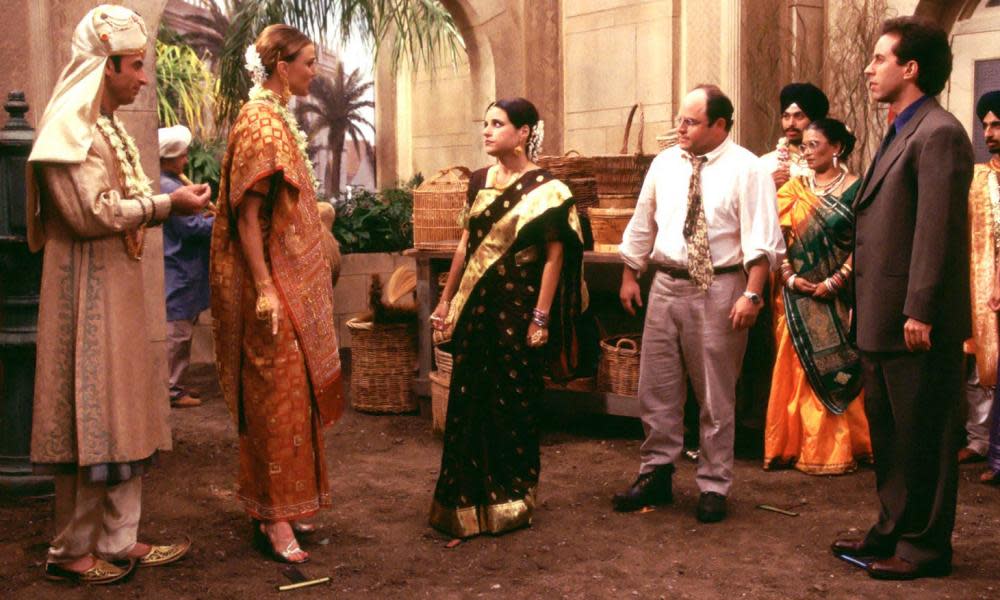From EastEnders to Twin Peaks: 10 of the best inventive TV episodes

The Seinfeld backwards episode
The Betrayal (season nine, episode eight)
Of course, in theory, all sitcom episodes are concept episodes. But some take this one step further, making daring structural changes that subvert the form as well as the content. Case in point: Seinfeld’s famous Harold Pinter-influenced, back-to-front episode from the show’s final season. Events unfold in reverse chronological order, starting with the end credits and working back to reveal the tale of a doomed Indian wedding.
The I Hate Suzie masturbation episode
Shame (season one, episode four)
Suzie (Billie Piper) tries to take her mind off a disastrous work call with some precious alone time. Though her fantasies keep being interrupted by her best friend and manager Naomi’s digressions on intersectional feminism, she edges her way to the episode’s climax (a record for TV masturbation), in a moving exploration of female desire.
The BoJack Horseman near-silent episode
Fish Out of Water (season three, episode four)
Every pub bore you know has already told you about BoJack’s underwater episode, how it was groundbreaking and profound and redefined the possibilities of television. The worst thing? They’re right. As the has-been horse actor attends a deep-sea film premiere, his struggles to communicate with the fish perfectly encapsulate urban alienation and existential malaise.
Related: The Guide: Staying In – sign up for our home entertainment tips
The Sopranos dream episode
The Test Dream (season five, episode 11)
After a season two episode where Tony has a series of food poisoning-inspired fever dreams, the show goes further with a dizzying 20-minute dream sequence. Tony staggers into various odd happenings in an instalment with the return of dead characters, lashings of subtext and an appearance by Annette Bening.
The SpongeBob SquarePants employee-induction episode
Krusty Krab Training Video (season three, episode 10)
Long before Rick and Morty, SpongeBob was the OG of joyously inventive, fourth-wall-breaking animation. Most episodes could feature here; in this one, the viewer is the Krusty Krab restaurant’s latest employee. A motivational video talks you through customer relations and negotiating a raise (the answer is “No”).
Twin Peaks: The Return goes the full Lynch
(episode eight)
It starts normally by David Lynch standards: ghostly dismemberment in a dark alley? Sure. Then things get strange: a six-minute Nine Inch Nails song, a quaint 1950s love story, a nuclear explosion, a repulsive frog-moth, and a terrifying man saying something terrifying about a horse. And if that’s not strange enough, there’s also the theory about playing the final two episodes simultaneously.
The Haunting of Hill House one-shot episode
Two Storms (season one, episode six)
The lure of the single take has drawn in many, in film (Hitchcock’s Rope) and TV (Mr Robot, Casualty). This is one of the most impressive – and terrifying. Filmed over five knitted-together takes, it is a tense family drama, alternating between a present-day funeral parlour and flashbacks in a ghost-infested mansion.
The I May Destroy You alternative endings episode
Ego Death (season one, episode 12)
A simple idea, flawlessly executed. As Arabella (Michaela Coel) struggles to finish her book, she maps out possible endings on her wall. She revisits the bar where she was assaulted and experiments with revenge, forgiveness, and something perhaps more disturbing. The open-endedness itself is the message, reflecting the impossibility of neatly resolving her trauma.
The Buffy musical episode
Once More, With Feeling (season six, episode seven)
Musical haters beware. You think you’re settling down to watch some quick-witted, questionably attired teens save the world from vampires, when all of a sudden they burst into song. Naturally, demonic possession is behind it: Sunnydale’s inhabitants have been placed under a curse and spend the next hour singing their darkest secrets.
Dot’s EastEnders monologue
Pretty Baby … (episode 3,518)
Dot (June Brown) sits on a beige sofa wearing a pink dressing gown, the ash on her fag getting dangerously long. She records a message for husband Jim, who’s recovering in hospital, and reminisces about her youth. A genuinely heartbreaking, poetic episode, inspired by Samuel Beckett’s Krapp’s Last Tape.

 Yahoo News
Yahoo News 
